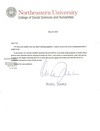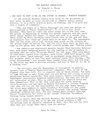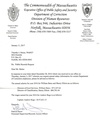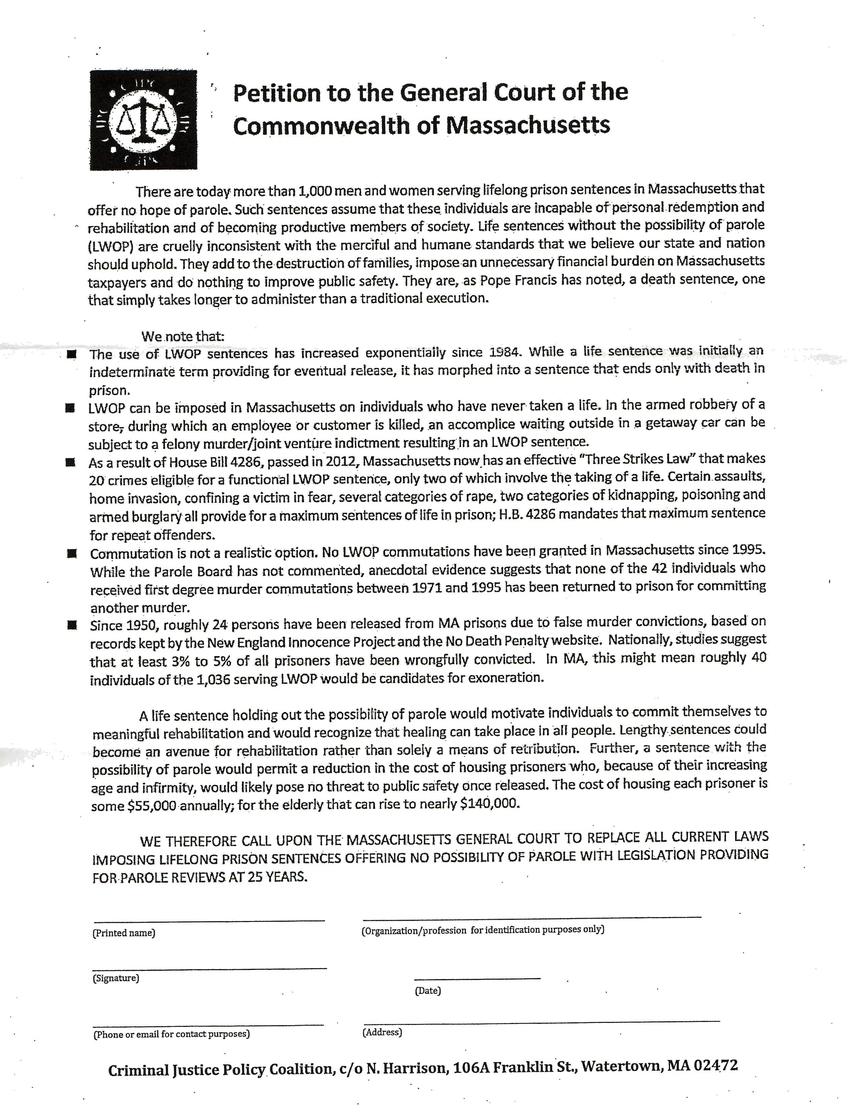
Transcription
Petition to the General Court of the Commonwealth of Massachusetts
There are today more than 1,000 men and women serving lifelong prison sentences in Massachusetts that offer no hope of parole. Such sentences assume that these individuals are incapable of personal redemption and rehabilitation and of becoming productive members of society. Life sentences without the possibility of parole (LWOP) are cruelly inconsistent with the merciful and humane standards that we believe our state and nation should uphold. They add to the destruction of families, impose an unnecessary financial burden on Massachusetts taxpayers and do nothing to improve public safety. They are, as Pope Francis has noted, a death sentence, one that simply takes longer to administer than a traditional execution.
We note that:
The use of LWOP sentences has increased exponentially since 1984. While a life sentence was initially an indeterminate term providing for eventual release, it has morphed into a sentence that ends only with death in prison.
LWOP can be imposed in Massachusetts on individuals who have never taken a life. In the armed robbery of a store, during which an employee or customer is killed, an accomplice waiting outside in a getaway car can be subject to a felony murder/joint venture indictment resulting in an LWOP sentence.
As a result of House Bill 4286, passed in 2012, Massachusetts now has an effective "Three Strikes Law" that makes 20 crimes eligible for a functional LWOP sentence, only two of which involve the taking of a life. Certain assaults, home invasion, confining a victim in fear, several categories of rape, two categories of kidnapping, poisoning and armed burglary all provide for a maximum sentences of life in prison; H.B. 4286 mandates that maximum sentence for repeat offenders.
Commutation is not a realistic option. No LWOP commutations have been granted in Massachusetts since 1995. While the Parole Board has not commented, anecdotal evidence suggests that none of the 42 individuals who received first degree murder commutations between 1971 and 1995 has been returned to prison for committing another murder.
Since 1950, roughly 24 persons have been released from MA prisons due to false murder convictions, based on records kept by the New England Innocence Project and the No Death Penalty website. Nationally, studies suggest that at least 3% to 5% of all prisoners have been wrongfully convicted. In MA, this might mean roughly 40 individuals of the 1,036 serving LWOP would be candidates for exoneration.
A life sentence holding out the possibility of parole would motivate individuals to commit themselves to meaningful rehabilitation and would recognize that healing can take place in all people. Lengthy sentences could become an avenue for rehabilitation rather than solely a means of retribution. Further, a sentence with the possibility of parole would permit a reduction in the cost of housing prisoners who, because of their increasing age and infirmity, would likely pose no threat to public safety once released. The cost of housing each prisoner is some $55,000 annually; for the elderly that can rise to nearly $140,000.
WE THEREFORE CALL UPON THE MASSACHUSETTS GENERAL COURT TO REPLACE ALL CURRENT LAWS IMPOSING LIFELONG PRISON SENTENCES OFFERING NO POSSIBILITY OF PAROLE WITH LEGISLATION PROVIDING FOR PAROLE REVIEWS AT 25 YEARS.
Other posts by this author
|
2017 jun 24

|
2017 jun 24

|
2017 jun 24

|
2017 jun 24

|
2017 jun 18

|
2017 jun 15

|
More... |


Replies